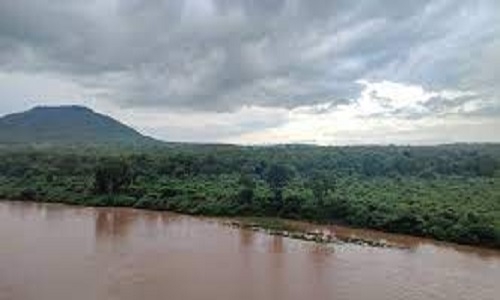Forest team use water sprinklers to keep cheetahs safe in Kuno National Park
| Date :31-May-2024 |

By Ankita Garg
In order to keep the cheetahs surviving in intensive heat wave conditions, forest officials have made various arrangement at Kuno National Park, situated in Sheopur district of Madhya Pradesh. Sheopur district is facing day temperature hovering around 48 degrees Celsius along with severe heat wave and dried weather condition that has presented a challenge before forest team. There are 27 cheetahs, including 14 cubs, and out of this, 25 are there in soft release Boma and two are in free range. DFO R Thirukural said, “It is becoming very challenging to keep the cheetah surviving amid the severe heat. A 13 km pipeline has been plotted with water spray to keep the surrounding colder.” He further said that arrangement were started since beginning of summer season. He said that plan was made to collect water from Kuno River and plotted a pipeline network to distribute the water in restricted area. He informed that two solar pumps are being used to collect the water from river and further distribution. Water was used to prepare additional sources and watering the tress. This space has become colder with water spray and green trees and most of time, female cheetahs and cubs spend time on the location.
He said that water sprinkler is used to keep the animal’s sitting area colder. The Cheetah Project has given a separate identity to India as cheetah is a predator that plays a significant role in maintaining ecological balance. Its rehabilitation would control the population of herbivores species. Cheetah has also started drawing a large number of tourists from different parts of the world that would generate revenue for the tourism sector. Taking lesson from the previous incident in which three cubs were died of heat stroke and dehydration, cheetah steering committee decided to take all precautionary steps. The committee had warned team to start preparing a shed in the enclosure during month of March.
Experts said that cheetah brought from Namibia and South Africa are easily adapting the rainy season and winter season in India. The ratio of cheetah’s death and birth in all three seasons winter, summer and monsoon proved that winter season in India is suitable for these cheetahs. On March 27, 2023, cheetah Jwala had delivered four cubs for the first time in India. Out of four, three cobs were in May or June. Only one cub is surviving and he is now one year old. Apart from these three cubs, five other cheetahs died during summer season. Talking to ‘The Hitavada’ over phone, District Forest Officer (DFO) Thirukural R said, “Four different sheds have been prepared specially for the 13 cheetah cubs to keep them safe from heat waves.” He further informed that apart from shed, water saucer, sprinklers and other arrangement have been done in enclosures for safety of adult cheetahs during summer.
